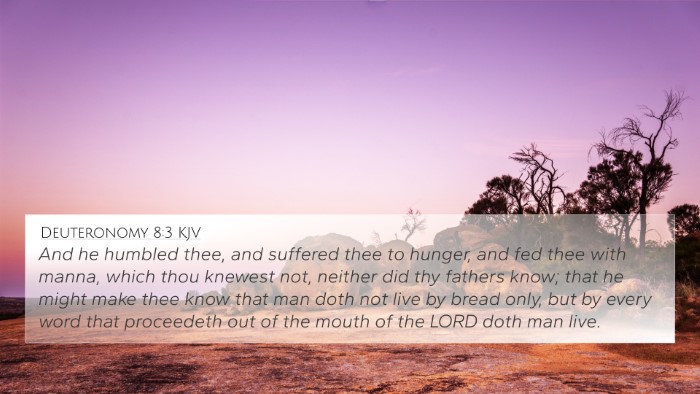Understanding 1 Timothy 6:8
Bible Verse: 1 Timothy 6:8 - "And having food and raiment let us be therewith content."
Commentary Summary
This verse from 1 Timothy serves as a reminder of the importance of contentment in the Christian life. Paul emphasizes that basic provisions—food and clothing—are sufficient for believers, contrasting material riches and the pursuit of excess with spiritual fulfillment. The Apostle Paul communicates a call to living a life focused on gratitude and contentment, reflecting a profound understanding of what truly matters in life.
Insights from Public Domain Commentaries
-
Matthew Henry:
Matthew Henry’s commentary points out that contentment is a key virtue for believers. He suggests that while human nature often craves more, true peace comes from appreciating what is necessary. The commentary stresses setting one’s mind on spiritual rather than temporal wealth, asserting that God’s provisions are always sufficient.
-
Albert Barnes:
Barnes interprets this verse as a call to embrace a minimalist outlook in life. He connects the idea of contentment with a proper focus on God’s gifts. He argues that satisfaction stems from recognizing that physical needs are met, and that we should not be swayed by societal pressures to acquire more than we need.
-
Adam Clarke:
Adam Clarke comments on the difference between needs and wants. He emphasizes the importance of being content with life’s basics and turns the reader's attention to the dangers of greed and avarice, which lead to unhappiness. Clarke additionally argues that one’s trust in God’s provision leads to genuine contentment and freedom from anxiety.
Bible Verse Cross-References
This verse correlates with several other Biblical texts that emphasize themes of contentment, provision, and the dangers of materialism:
- Philippians 4:11-13: Paul expresses his ability to be content in all circumstances, underscoring the importance of inner strength through Christ.
- Hebrews 13:5: Encourages believers to be content with what they have, as God has promised never to leave us.
- Matthew 6:25-34: Jesus teaches that life is more than food and clothing, urging us to seek first the Kingdom of God.
- Proverbs 30:8-9: Agur’s prayer for neither poverty nor riches demonstrates the wisdom of moderation and reliance on God.
- 1 Peter 5:7: Calls believers to cast their cares upon the Lord, aligning with the theme of trusting God for needs.
- Ecclesiastes 5:10: A reminder that those who love money will never be satisfied, supporting the premise of contentment.
- Luke 12:15: Jesus warns against greed, reminding us that life does not consist in the abundance of possessions.
Thematic Connections
The themes present in 1 Timothy 6:8 resonate through both the Old and New Testaments:
- Contentment: A recurring virtue, highlighting the importance of mental and spiritual peace over material possessions.
- Dependence on God: Emphasizes reliance on God’s provision for both spiritual and physical needs.
- Warning against Greed: Both Paul and Jesus caution against the allure of wealth and its potential to distract from faith.
Tools for Bible Cross-Referencing
To engage more deeply with themes like those found in 1 Timothy 6:8, consider using the following tools and methods for effective Bible cross-referencing:
- Bible Concordance: An invaluable tool for finding specific verses and understanding their context.
- Bible Cross-Reference Guide: Helps locate verses that relate to particular themes or concepts.
- Cross-Reference Bible Study: Engages believers to explore interconnections between scriptures.
- Bible Reference Resources: Offers comprehensive insights and parallels to deepen understanding.
Exploration of Inter-Biblical Dialogue
Understanding the connections between different biblical texts fosters a richer understanding of scripture. Here are methods to explore these connections:
- Identifying connections between Old and New Testament: Investigating how themes of contentment and provision span the entirety of scripture.
- Detailed cross-reference between Gospels: Highlighting similar teachings of Jesus regarding material possessions and contentment.
- Cross-referencing Psalms with New Testament teachings: Finding parallels that affirm the timeless nature of God’s promises.
Conclusion
1 Timothy 6:8 offers profound insights on the nature of contentment and God's provision. By linking this verse with others, believers can deepen their understanding of what it means to be content and the spiritual freedom that comes from reliance on God. Through the use of Bible cross-references and thematic explorations, we can appreciate the interconnected nature of scripture, fostering a deeper faith and lifestyle aligned with biblical teachings.













